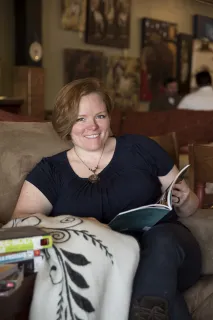When Big Waters Come
Science fiction fans have probably heard of Kim Stanley Robinson, Margaret Atwood, and Paolo Bacigalupi and may have read some of their works that fall under the climate fiction, or cli-fi, subgenre. But, there are so many more! The following list highlights my favorites cli-fi stories from authors of color, who come from populations with a higher vulnerability to climate change and a history of exploitation. That background lends to a stark and eye-opening view of what life could be like under "The Big Water," to use Roanhorse's term, and ranges from poetic and thoughtful to action-packed.
This was a stellar debut; think Mercy Thompson meets Michonne. I look forward to where Roanhorse goes from here. Action-packed, a little romance, and intriguing world-building on a reservation that is walled off from the rest of a world consumed by The Big Waters.
Easily one of my favorite books of 2018. An orcamancer arrives on a corrupt floating city where amazing tech and brutal poverty go hand-in-hand searching for her family. A disease called "the breaks" begins to claim both rich and poor, and four unlikely people ally to fight the decay of their world. Plus, the cover glows in the dark!
Dimaline's writing is lyrical and mysterious hinting at things more wonderful and terrible at every turn. Have tissues ready.
Erdrich is another lyrical writer and tends to a more domestic type of story than others on this list. It made me too uncomfortable to be a favorite exactly, but the feeling of terror and lost autonomy was even more haunting than "A Handmaid's Tale."
Though more of a classic dystopia than a climate apocalypse, this book has much the same feeling. Bruchac's young warrior woman kicks tail.
Written years before "cli-fi" was coined, Butler draws a realistic and terrifying narrative of a young woman on the run in a divided and desperate California. Spooky.
Fast-paced with flawed and real characters on a mission for a better life, Smith also uses real locations in New Orleans to bring the reader into the sense of tragedy and loss.
This is a heavy topic and the futures postulated above are generally grim. So I recommend "Drawdown," a book that's ultimately hopeful. It's a detailed and well-researched path toward a better future that's also digestible with lots of great photography.
